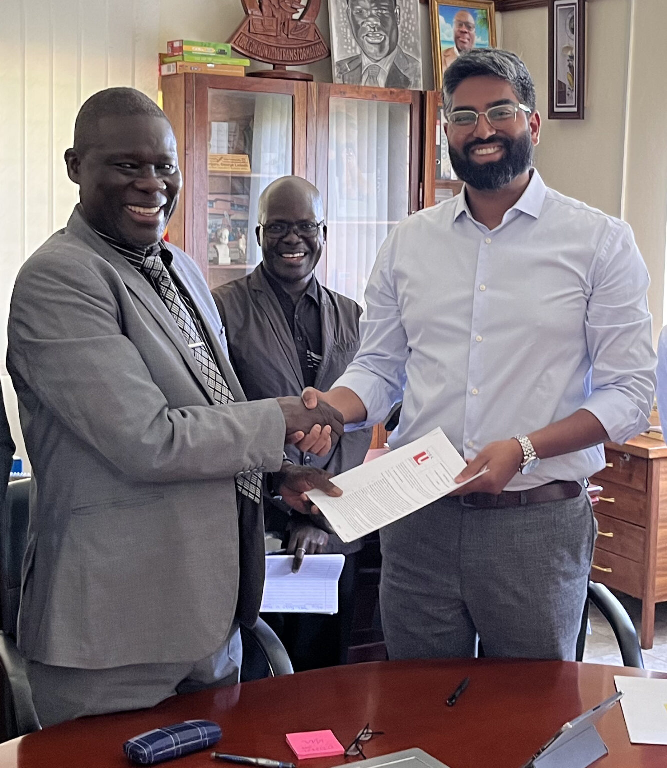Two new research collaborations led by the Humanitarian Water Engineering (HWE) Lab at York University's Dahdaleh Institute for Global Health Research aim to improve health outcomes in crisis-affected communities in Uganda through local partnerships and innovative water-focused interventions.

Syed Imran Ali (right) and Gulu University Vice-Chancellor George Openjuru (left) shaking hands as they sign the memorandum of understanding.
Syed Imran Ali, Director of the HWE Lab and Fellow at the Dahdaleh Institute, and his team recently travelled to Uganda to launch two new research partnerships aimed at improving public health in communities affected by humanitarian crises.
The first initiative took Ali and his team to Gulu University, where they met with faculty from Gulu's School of Medicine, Faculty of Agriculture and the Environment, and Institute of Peace and Strategic Studies. Together, they defined and formalized a new collaborative research program, marked by the signing of a memorandum of understanding between the two institutions.
Located in a region recovering from prolonged civil conflict and home to a large refugee population fleeing unrest in neighbouring countries, Gulu University will work with the HWE Lab on projects addressing communicable disease control, maternal and child health, nutrition, and water, sanitation and hygiene (WASH) in emergency contexts.
Supported by York International's Global Research Excellence Seed Fund, the first joint projects will focus on water and health in refugee settlements in northern Uganda. Over time, the partnership aims to expand into additional priority areas in humanitarian health and bring in new partner institutions from neighbouring countries, contributing to a broader vision for a humanitarian health research network across the African Great Lakes Region.
Ali and his team also visited the Kyaka II refugee settlement in western Uganda to initiate a second research collaboration with the Nsamizi Training Institute of Social Development. A key implementing partner for the UN Refugee Agency (UNHCR), Nsamizi is responsible for delivering WASH services at the settlement.
Supported by a Connected Minds Seed Grant from the Canada First Research Excellence Fund, this project will use machine learning to develop predictive tools linking water quality to health outcomes. The goal is to address a long-standing challenge in the humanitarian WASH sector: enabling timely health risk forecasting without relying on costly, large-scale disease surveillance studies.
Over the coming year, the HWE Lab will work with Nsamizi to strengthen water system monitoring, provide technical training, and support the development of proposals for future water and sanitation programs at Kyaka II and other refugee settlements in Uganda.
Together, these two partnerships mark a significant step forward in the HWE Lab's mission to deliver practical, innovative solutions to urgent global health challenges through close collaboration with local institutions.
This story was originally featured in YFile, York University's community newsletter










